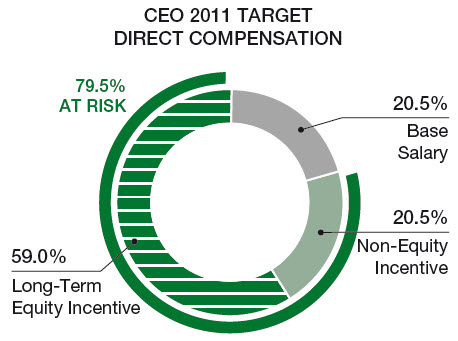Ford ceo stock options and equity risk incentives
According to Armstrong and Taylor, there is no easy way to fine-tune an incentive package to induce a CEO to take only certain kinds of risks — a manager with a strong risk appetite, they note, may be enticed to invest in a cutting-edge new product, but he or she also may be encouraged to engage in financial misreporting.
The paper, which was co-authored by David Larcker of Stanford University and Gaizka Ormazabal at the University of Navarra in Pamplona, Spain, was published in the Journal of Financial Economics. Equity incentives encourage CEOs to take risks that have a high payoff, which is often what shareholders want, he points out. Risk appetite changes predictably, it turns out, if options are in-the-money, at-the-money or out-of-the-money that is, set to make money, break even or lose money.
To understand the link between moneyness and risk appetite, consider a pair of CEOs. Alternatively, he or she can accept a risk with potential to move the stock price. Either way, the value of the options changes in lock-step with stock price — as long as the options remain in the money.
Now consider the CEO with 1, options issued at-the-money.
CEO Stock Options and Equity Risk Incentives - Williams - - Journal of Business Finance & Accounting - Wiley Online Library
Exercising these options will not generate a gain or a loss excepting transaction costs. No exercise of options means no money made or lost. All else equal, the CEO with at-the-money options has a stronger incentive to take added risk, the researchers say. Because at-the-money options have an intrinsic value that is less sensitive to stock price declines. They limit the downside without capping the upside — a thought worth exploring when boards vote to grant options.
If it goes well, the intrinsic value increases.
Using Incentives to Calibrate a CEO's 'Risk Appetite' - Knowledge@Wharton
Countless twists are easy to imagine. In that case, says Taylor, lose and the downside is capped. Win and the sky is the limit.
Because benign errors trigger some restatements, the researchers focused their attention on statements found by AuditAnalytics to stem from fraud, misrepresentation or an investigation by the Public Company Accounting Oversight Board PCAOB. The research examined three common measures of misreporting: Two types of investigation — regression analysis and matched pairs — reinforce the unambiguous correlation between equity incentives and the propensity to misreport financial data.
In both, moneyness risk trumps the stock price as an indicator of risk appetite. Evidence shows that the effect of risk on misreporting is economically large and greater than many other determinants of misreporting. Firms responsible for the positive correlation between risk-taking incentives and misreporting have much larger discretionary accruals — more instances of restating financial results and a heightened chance of SEC enforcement actions.
The researchers questioned whether the impact of misreporting stems more from the moneyness of the options at the time they were granted to the executive or from subsequent changes in moneyness due to stock price fluctuations. Their data show that the relation between stock price and misreporting is driven by the component of risk-taking incentives attributable to features of the grant itself, rather than changes in risk-taking incentives attributable to company performance after grants are issued.
Taylor and Armstrong both caution against overreaction.
Scrapping equity incentives might reduce incentives to misreport, but at a cost, they warn. Many, if not most, shareholders accept certain side effects of equity incentives as a cost of doing business. Financial reforms in China lag far behind the country's outsized impact on the global economy.
How far and how fast should its global financial integration go? Amazon's purchase of Whole Foods expands its presence in the grocery space, but could also provide a boost to the company across multiple sectors. Data analytics enables enterprises to delight their customers by delivering customized and integrated omnichannel experiences. Log In or sign up to comment. All materials copyright of the Wharton School of the University of Pennsylvania. Wharton, University of Pennsylvania The K W Network: How Far, How Fast Financial reforms in China lag far behind the country's outsized impact on the global economy.

What Whole Foods Brings to the Table Amazon's purchase of Whole Foods expands its presence in the grocery space, but could also provide a boost to the company across multiple sectors. Sponsored Content Omnichannel 2. Delivering a Tailored Experience to Customers Data analytics enables enterprises to delight their customers by delivering customized and integrated omnichannel experiences.
Join The Discussion No Comments So Far Log In or sign up to comment.
Knowledge Wharton Partners View All Partners Partner Collaborations Become a Content Partner. Podcasts Hear what CEOs, Wharton faculty, and other commentators have to say about the latest business trends, breaking news and market research in their own words. About Knowledge Wharton Become a Content Partner Privacy Policy Feedback All materials copyright of the Wharton School of the University of Pennsylvania.